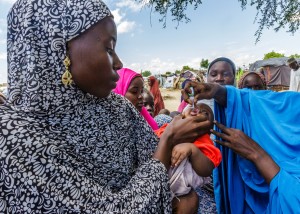(只有英文)與時間競賽:防止小兒麻痺症在尼日利亞擴散
2016-08-17
© UNICEF/UN028224/Esiebo
(只有英文版本)
In Muna Garage IDP Camp, Borno State, Nigeria, a UNICEF health worker uses a pen to mark the thumb of Ajeda, 6 months, who has just been vaccinated against polio. It is her first vaccination, having been born under Boko Haram captivity.
By Geoffrey Njoku
Last week, two cases of wild poliovirus were found in conflict-affected areas of north-east Nigeria – the first cases in two years. An emergency immunization campaign is now being carried out reach five million children in Borno and three surrounding states.
MAIDUGURI, Nigeria/HONG KONG, 17 August 2016 – Six-month-old Ajeda received her first dose of polio vaccine today at a camp for displaced persons outside Maiduguri city, north-east Nigeria.
Ajeda was born in captivity and has never been immunized. “I gave birth when our village was occupied by Boko Haram. No vaccinators ever came to us,” said Ajeda’s mother, Fatari.
Fatari ought her child for the polio drops after volunteer community mobilizers alerted her about the vaccination campaign in the camp, where she has lived for two months.
“I am prepared to do anything to keep my children safe,” she said. All of her five children are now immunized against polio.
After two cases of wild poliovirus were found in conflict-affected areas last week – the first cases in two years – an emergency immunization campaign is being carried out to reach one million children under five years of age in Borno State. Over the next few months, large-scale polio vaccination drives in three adjoining states will ing that number to five million children.

© UNICEF/UN028222/EsieboAjeda receives her first dose of polio vaccine from a UNICEF health worker at a camp for internally displaced persons outside Maiduguri north-east Nigeria.
The drives will be synchronized with polio immunizations for children across the Lake Chad region, an area that comprises parts of Nigeria, Niger, Cameroon and Chad.
Thousands of volunteer community mobilizers will educate families on the importance of immunization and inform them on when and where to have their children vaccinated.
“These people are coming from communities that have not been reached in three years due to the conflict in the north-east,” said Mohammed Iahim, UNICEF Programme Officer for immunization in Borno State. “The crowded conditions in the camps make diseases spread faster, and this puts children at higher risk of polio infection,” he said.
Muna Garage camp for internally displaced persons, where little Ajeda received her first dose of the polio vaccine, is home to an estimated 20,000 people.
Eighteen teams of vaccinators are now working in the camp to ensure all of the 5,000 children under five are immunized.
The polio vaccination campaign is led by the Ministry of Health in Nigeria, with support from the World Health Organization (WHO), UNICEF and partners of the Global Polio Eradication Initiative.









